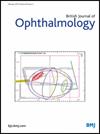Detection of glaucoma progression on longitudinal series of en-face macular optical coherence tomography angiography images with a deep learning model
IF 3.7
2区 医学
Q1 OPHTHALMOLOGY
引用次数: 0
Abstract
Background/aims To design a deep learning (DL) model for the detection of glaucoma progression with a longitudinal series of macular optical coherence tomography angiography (OCTA) images. Methods 202 eyes of 134 patients with open-angle glaucoma with ≥4 OCTA visits were followed for an average of 3.5 years. Glaucoma progression was defined as having a statistically significant negative 24-2 visual field (VF) mean deviation (MD) rate. The baseline and final macular OCTA images were aligned according to centre of fovea avascular zone automatically, by checking the highest value of correlation between the two images. A customised convolutional neural network (CNN) was designed for classification. A comparison of the CNN to logistic regression model for whole image vessel density (wiVD) loss on detection of glaucoma progression was performed. The performance of the model was defined based on the confusion matrix of the validation dataset and the area under receiver operating characteristics (AUC). Results The average (95% CI) baseline VF MD was −3.4 (−4.1 to −2.7) dB. 28 (14%) eyes demonstrated glaucoma progression. The AUC (95% CI) of the DL model for the detection of glaucoma progression was 0.81 (0.59 to 0.93). The sensitivity, specificity and accuracy (95% CI) of DL model were 67% (34% to 78%), 83% (42% to 97%) and 80% (52% to 95%), respectively. The AUC (95% CI) for the detection of glaucoma progression based on the logistic regression model was lower than the DL model (0.69 (0.50 to 0.88)). Conclusion The optimised DL model detected glaucoma progression based on longitudinal macular OCTA images showed good performance. With external validation, it could enhance detection of glaucoma progression. Trial registration number [NCT00221897][1]. Data are available upon reasonable request. The datasets generated and/or analysed during the current study are available from the corresponding author on reasonable request. [1]: /lookup/external-ref?link_type=CLINTRIALGOV&access_num=NCT00221897&atom=%2Fbjophthalmol%2Fearly%2F2024%2F08%2F07%2Fbjo-2023-324528.atom利用深度学习模型检测纵向系列面黄斑光学相干断层血管造影图像上的青光眼进展情况
背景/目的 设计一种深度学习(DL)模型,利用纵向系列黄斑光学相干断层血管造影(OCTA)图像检测青光眼进展。方法 对 134 名 OCTA 检查次数≥4 次的开角型青光眼患者的 202 只眼睛进行了平均 3.5 年的随访。青光眼进展的定义是24-2视野(VF)平均偏差(MD)率出现统计学意义上的负值。基线和最终黄斑 OCTA 图像根据眼窝血管区中心自动对齐,方法是检查两幅图像之间的最高相关值。设计了一个定制的卷积神经网络(CNN)用于分类。针对整个图像血管密度(wiVD)损失对青光眼进展的检测,将 CNN 与逻辑回归模型进行了比较。根据验证数据集的混淆矩阵和接受者操作特征下面积(AUC)来确定模型的性能。结果 平均(95% CI)基线 VF MD 为 -3.4 (-4.1 to -2.7) dB。28(14%)只眼出现青光眼进展。DL 模型检测青光眼进展的 AUC(95% CI)为 0.81(0.59 至 0.93)。DL模型的灵敏度、特异度和准确度(95% CI)分别为67%(34%至78%)、83%(42%至97%)和80%(52%至95%)。基于逻辑回归模型检测青光眼进展的 AUC(95% CI)低于 DL 模型(0.69(0.50 至 0.88))。结论 基于纵向黄斑 OCTA 图像检测青光眼进展的优化 DL 模型表现良好。通过外部验证,该模型可提高对青光眼进展的检测能力。试验注册号[NCT00221897][1]。如有合理要求,可提供数据。本研究中生成和/或分析的数据集可向通讯作者索取。[1]:/lookup/external-ref?link_type=CLINTRIALGOV&access_num=NCT00221897&atom=%2Fbjophthalmol%2Fearly%2F2024%2F08%2F07%2Fbjo-2023-324528.atom
本文章由计算机程序翻译,如有差异,请以英文原文为准。
求助全文
约1分钟内获得全文
求助全文
来源期刊
CiteScore
10.30
自引率
2.40%
发文量
213
审稿时长
3-6 weeks
期刊介绍:
The British Journal of Ophthalmology (BJO) is an international peer-reviewed journal for ophthalmologists and visual science specialists. BJO publishes clinical investigations, clinical observations, and clinically relevant laboratory investigations related to ophthalmology. It also provides major reviews and also publishes manuscripts covering regional issues in a global context.

 求助内容:
求助内容: 应助结果提醒方式:
应助结果提醒方式:


